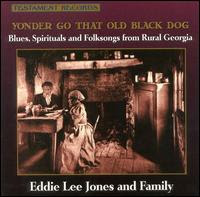Marketing
Eddie Lee Jones And Family - Yonder Go That Old Black Dog
 Styles: Acoustic Blues
Styles: Acoustic Blues
Label: Testament
Released: 1995
File: mp3 @320K/s
Size: 88,5 MB
Time: 38:41
Art: full
1. Yonder Go That Old Black Dog - 2:15
2. Baby, Please Don't Go - 1:56
3. She's Mine, She's Yours - 3:55
4. Oh Graveyard, You Can't Hold Me Always - 1:56
5. You're Gonna Need My Help Someday - 2:23
6. Slide Instrumental - 1:20
7. Stop And Listen - 2:52
8. I May Never See You Anymore - 2:29
9. I Got A Yellow Gal - 1:59
10. John Henry - 4:31
11. I Won't Be Troubled No More - 2:49
12. I'm Talking 'Bout You - 1:26
13. Keep Your Lamp Trimmed And Burning - 3:06
14. Instrumental - 1:37
15. Let That Liar Alone - 1:44
16. Which Way Does The Blood Red River Flow - 2:15
Notes: In 1965 folklorist Bill Koon was out for a walk near Lexington, GA, when he happened across Eddie Lee "Mustright" Jones playing guitar on a porch. Intrigued, Koon walked up and introduced himself, quickly realizing that Jones' archaic song repertoire, which bounced between old black spirituals, early blues, and interpretations of fiddle dance tunes, was something special. He returned with a reel-to-reel recorder and taped several hours of Jones singing and playing, often with interjections and unsolicited vocals from Jones' family and friends. The results were released on Pete Welding's Testament label. Little else is known about Jones, but his music has a wonderful, ragged charm.
Yonder Go That Old Black Dog is a very special album, perhaps more important for the atmosphere it sets than for the quality of the actual recordings. Compiled by folklorist Bill Koon from field recordings he made after encountering Eddie Lee "Mustright" Jones playing guitar on a porch in Lexington, GA, in 1965, the album has the feel of an early 19th century African-American singalong, with Jones' family and friends adding spoken interjections and impromptu background vocals to whatever Jones is singing. The material isn't blues as such, although Jones' guitar playing and slide work definitely has a bluesy tone to it, but tends to drift closer to folk spirituals and guitar renditions of fiddle dance tunes. Nothing here is slick or polished, but the easy, communal intimacy of hearing Jones and his family tackle "Yonder Go That Old Black Dog," "I May Never See You Anymore," "I'm Talking 'Bout You," "Let That Liar Alone," the blues spiritual "Keep Your Lamp Trimmed and Burning," and the folk chestnut "John Henry" makes this a valuable document of how families entertained themselves before radio, television, and computers came along to alter everything. Insular, gentle, amateur, and endearing, Yonder Go That Old Black Dog is a fascinating album, intended mostly for music scholars, but with an undeniable charm that should appeal to the casual listener.
Yonder Go That Old Black Dog

• Celso Salim & Rodrigo Mantovani - Diggin' The Blues
• Cliff Aungier - The Acoustic Blues
Posted by muddy
Post je objavljen 26.01.2014. u 22:23 sati.